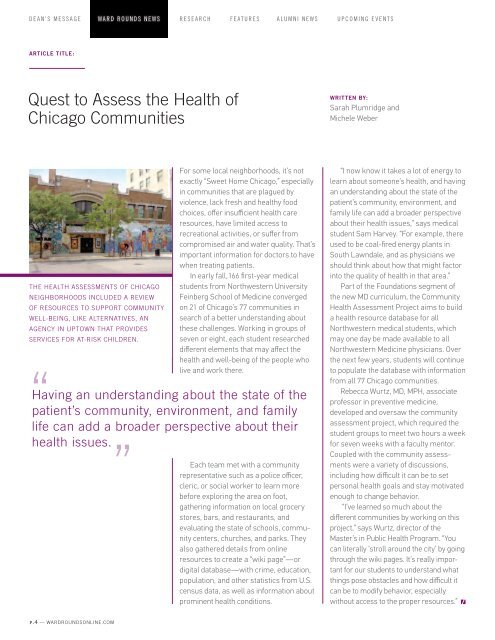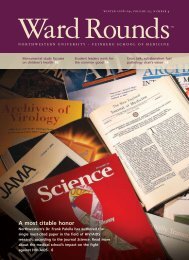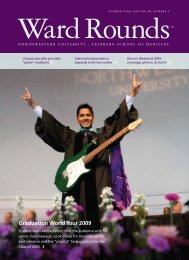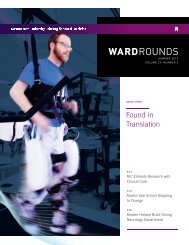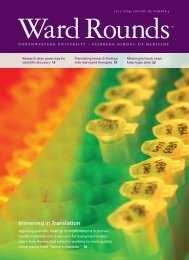Download PDF - Ward Rounds - Northwestern University
Download PDF - Ward Rounds - Northwestern University
Download PDF - Ward Rounds - Northwestern University
You also want an ePaper? Increase the reach of your titles
YUMPU automatically turns print PDFs into web optimized ePapers that Google loves.
DEAN’S MESSAGE WARD ROUNDS NEWS RESEARCH FEATURES ALUMNI NEWS UPCOMING EVENTS<br />
Article Title:<br />
Quest to Assess the Health of<br />
Chicago Communities<br />
Written by:<br />
Sarah Plumridge and<br />
Michele Weber<br />
The health assessments of Chicago<br />
neighborhoods included a review<br />
of resources to support community<br />
well-being, like Alternatives, AN<br />
agency in Uptown that provides<br />
services for at-risk children.<br />
For some local neighborhoods, it’s not<br />
exactly “Sweet Home Chicago,” especially<br />
in communities that are plagued by<br />
violence, lack fresh and healthy food<br />
choices, offer insufficient health care<br />
resources, have limited access to<br />
recreational activities, or suffer from<br />
compromised air and water quality. That’s<br />
important information for doctors to have<br />
when treating patients.<br />
In early fall, 166 first-year medical<br />
students from <strong>Northwestern</strong> <strong>University</strong><br />
Feinberg School of Medicine converged<br />
on 21 of Chicago’s 77 communities in<br />
search of a better understanding about<br />
these challenges. Working in groups of<br />
seven or eight, each student researched<br />
different elements that may affect the<br />
health and well-being of the people who<br />
live and work there.<br />
“<br />
Having an understanding about the state of the<br />
patient’s community, environment, and family<br />
life can add a broader perspective about their<br />
health issues.<br />
“<br />
Each team met with a community<br />
representative such as a police officer,<br />
cleric, or social worker to learn more<br />
before exploring the area on foot,<br />
gathering information on local grocery<br />
stores, bars, and restaurants, and<br />
evaluating the state of schools, community<br />
centers, churches, and parks. They<br />
also gathered details from online<br />
resources to create a “wiki page”―or<br />
digital database―with crime, education,<br />
population, and other statistics from U.S.<br />
census data, as well as information about<br />
prominent health conditions.<br />
“I now know it takes a lot of energy to<br />
learn about someone’s health, and having<br />
an understanding about the state of the<br />
patient’s community, environment, and<br />
family life can add a broader perspective<br />
about their health issues,” says medical<br />
student Sam Harvey. “For example, there<br />
used to be coal-fired energy plants in<br />
South Lawndale, and as physicians we<br />
should think about how that might factor<br />
into the quality of health in that area.”<br />
Part of the Foundations segment of<br />
the new MD curriculum, the Community<br />
Health Assessment Project aims to build<br />
a health resource database for all<br />
<strong>Northwestern</strong> medical students, which<br />
may one day be made available to all<br />
<strong>Northwestern</strong> Medicine physicians. Over<br />
the next few years, students will continue<br />
to populate the database with information<br />
from all 77 Chicago communities.<br />
Rebecca Wurtz, MD, MPH, associate<br />
professor in preventive medicine,<br />
developed and oversaw the community<br />
assessment project, which required the<br />
student groups to meet two hours a week<br />
for seven weeks with a faculty mentor.<br />
Coupled with the community assessments<br />
were a variety of discussions,<br />
including how difficult it can be to set<br />
personal health goals and stay motivated<br />
enough to change behavior.<br />
“I’ve learned so much about the<br />
different communities by working on this<br />
project,” says Wurtz, director of the<br />
Master’s in Public Health Program. “You<br />
can literally ‘stroll around the city’ by going<br />
through the wiki pages. It’s really important<br />
for our students to understand what<br />
things pose obstacles and how difficult it<br />
can be to modify behavior, especially<br />
without access to the proper resources.”<br />
p.4 — wardroundsonline.com


